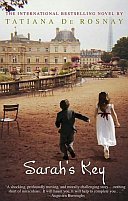Sarah's Key
 by Tatiana De
Rosnay
by Tatiana De
Rosnay

Remembering
the forgotten
In Paris 1942, French police arrest 10
year old Sarah and her family in a drive to round up Jewish families.
In an effort to save her brother Michel, she locks him in their secret
hiding place to keep him safe from harm, planning to release him on her
return. In 2002, 60 years after the anniversary of the Velodrome
d'Hiver incident, Julia Jarmond, a writer for an American journal,
investigates this roundup of Jewish children by the French government.
A slip from a family member and her investigation reveal decades of
secrets within her family that link her family to Sarah. The horror of
one moment in time reverberates through generations, transforming lives
through generations. Julia's investigation unlocks unexpected links,
tying them all together and linking disparate people whose lives have
been touched by Sarah. Obsessed with the desire to unveil the secrets,
Julia's investigation becomes more personal, transforming her life on
the most intimate levels.
Told in alternating time periods by chapter so that the reader hears
both Sarah's young voice speaking out from the past and Julia's voice, SARAH'S KEY builds up a level of
emotion and suspenseful anticipation as the reader feels Sarah's
experiences firsthand. Julia's investigation reveals the historical
facts alongside Sarah's journey. The indifference, lack of knowledge
and even denial Julia sees in her interviews 60 years after the event
provides an eerie backdrop to Sarah's account of the historic events.
How could so many Parisian children and families be removed from sight
like this, not by the Germans but French citizens themselves? Julia's
investigation of the Velodrome d'Hiver children (later transported to
Auschwitz through various French concentration camps) provides a deeply
troubling look into those later generations living near the site for
whom history has no meaning.
Sarah's voice haunts with its innocence, an innocence shattered as she
sees the nightmare around her. Her questions reverberate with a
sharpness that cuts through right to the heart. The alternation between
voices aligns the reader with Julia as the reader feels anxious to
learn the details of Sarah's life. Later in the novel, the narrative
switches exclusively to Julia's voice. From this point on in an
increasing manner, the once awesome link between characters shifts in
tone, and the book becomes problematic for me. SARAH'S KEY seems meant to be a
tribute to the children but Julia's character begins to co-opt Sarah's
story. Julia becomes so obsessed but her focus feels dogmatically more
self-centered and the search for Sarah's life becomes more about Julia
than Sarah. At this juncture, Julia's emotions take over and yet she is
not a direct party to the event like other characters. Julia is not a
direct witness, not a French citizen who lived through the times, but
somewhat of an outsider to the drama before her and even within her
in-laws' family so that her quest portrays her somewhat as a grand
savior. Perhaps, an outsider is needed as a catalyst to provoke and
unearth the long-held secrets but Julia's angst feels somewhat trivial
as compared to Sarah's life, thereby lessening the depth of the
redemptive possibilities so clearly present in other parts of the
novel. In the beginning, Julia listens attentively, ferreting out
voices from the silence surrounding Sarah's life. From silence, Julia
makes history vividly alive but as the story develops, Julia pushes
everyone by her obsession, never really listening to those involved
from the past or in her own personal life. She becomes an agent for
others whether they want it or not. From her husband to Sarah's family,
Julia just brushes their desires aside and does what she wants. Her
character and her self-centeredness begin to grate on the nerves at the
end, all the more so because the preceding exquisiteness of the
narrative built up higher expectations for the ending.
SARAH'S KEY is an
important work of historical fiction, bringing the story of the
Velodrome d'Hiver children into the light, giving a memory through
fiction that makes these children alive. SARAH'S KEY remembers the
forgotten. Tatiana De Rosnay brings to life a less documented moment of
history beyond just the details or recorded names. The reader is right
there with Sarah, asking the same questions through her eyes. Tatiana
de Rosnay asks the hard questions and reveals the complicity and
silences surrounding this little known event. She gives voice to a
silenced voice, a child dehumanized and hidden from view by the events
of the Holocaust and the silence of future generations. While Julia's
character detracts from the sheer power of the book towards the end, SARAH'S KEY is a work of historical
fiction that will haunt and uplift readers in the small details of
human kindness within this dark, tragic moment of history.
Publisher: St. Martin's Griffin (September
2008)
Reviewed by Merrimon,
Merrimon Book Reviews
Review Courtesy of Amazon Vine
